10 Reasons Why We Sleep
Sleep is a condition of the body and mind that happens for several hours every night, mostly in which a major part of the nervous system is relatively inactive along with the closure of the eyes, switching-off of the sensory input, decrease in the appreciation of hearing, partial suppression of other senses like touch and smell, relaxation of the postural muscles, and practical suspension of consciousness.
Normal life processes like sleep are as important as any other vital process like breathing, eating, etc. Nearly half of one’s life is spent sleeping if one has to have good health. Sleep is not a mere inactivation of wakefulness but many other vital functions of the brain take place during sleep.
As mentioned above, sleep has functions apart from just the suppression of one’s consciousness. Here are some of the bodily processes that take place while sleeping:
1.Energy Conservation

As sleep is a phase of inactivity, the energy reserves are out of use and are kept for future use. Production of ATP (Adenosine Triphosphate), the energy molecule, occurs as a result of uninterrupted food digestion and metabolism but the use of it is limited so as to be used only during daytime activities. Although, there is some energy consumption that occurs during digestive processes, breathing, heart functions, and other vital functions.
2. Repair / Restoration
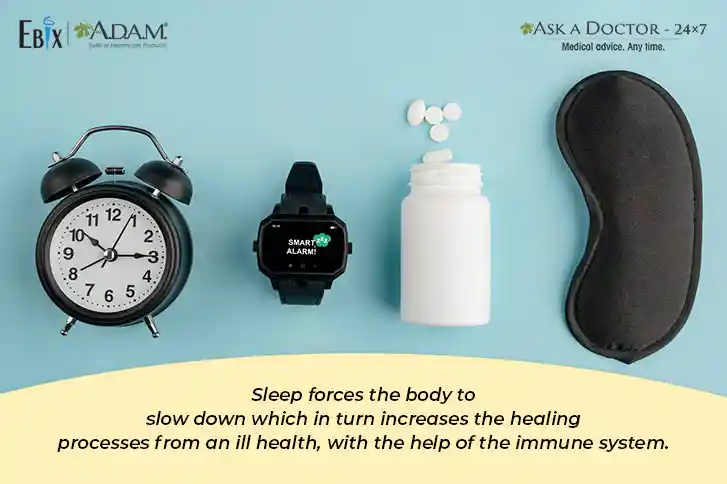
Repair of any damaged tissues and the overall growth process occurs at night time. The release of growth hormones is to the maximum at night during sleep. The growth hormone along with other hormones like thyroid hormone, testosterone, cortisol, etc., are involved in the growth and repair processes. It is very essential for one to sleep optimally to have a healthy growth and repair trajectory of the damaged or worn-out tissues in the body.
3. Information Processing and Memory Consolidation

Wakefulness is burdened with a lot of inputs from the eyes, ears, skin, and other senses. It is not feasible for the brain to process all this information, to segregate the information into what is important and unimportant. Also, once the information which is important is decided either by repetition or personal experience of the person, it is stored as memory. Most of this process occurs in the hippocampus, an important part of the brain.
4. Immune Regulation

As mentioned above, due to a part of the brain going to rest, the remaining part concentrates on homeostasis in many vital aspects. Immunity is one such process, wherein the production of white blood cells (WBCs) occurs as a part of replication which is nothing but growth in a sense. These WBCs play a vital role in immunity which is our resistance power towards foreign antigens; such antigens could be a virus, bacterium, etc.
5. Mood Regulation

The release of most of the hormones is at its peak during sleep. Some of them include stress response and stress-alleviating hormones. These hormones either push away the inhibiting stimulus or overcome the negativity created by the external thought stimuli. This in turn elevates one’s mood and keeps one fresh of mind after a night’s sleep.
6. Synaptic Regulation
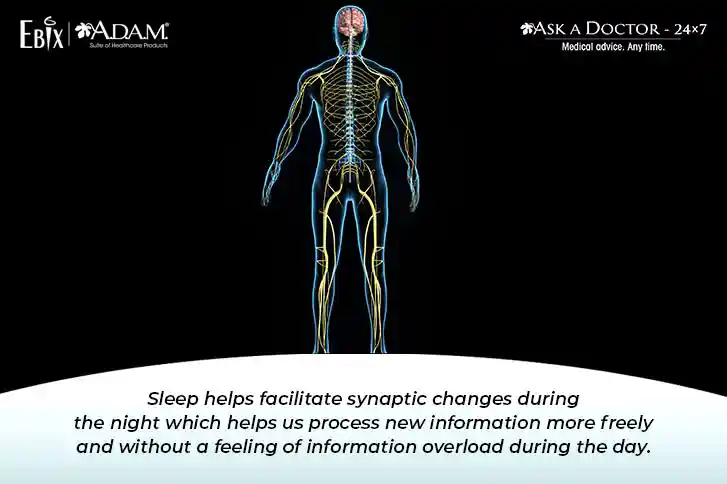
Synapses are junctions between the nerves in the central nervous system (The brain) and peripheral nervous system (peripheral nerves). These are the places where the information is conveyed from one nerve to another in the process of conducting information. The information flows in both directions from sense organs and other tissues to the brain and from the brain to these organs, muscles, etc. The information transfer occurs in the form of the movement of chemical neurotransmitters from one nerve to the other. During sleep, the neurotransmitter balance is maintained, freeing the nerve junctions from residual chemical neurotransmitters which might interrupt or intervene in a healthy information transfer.
7. Waste Clearance
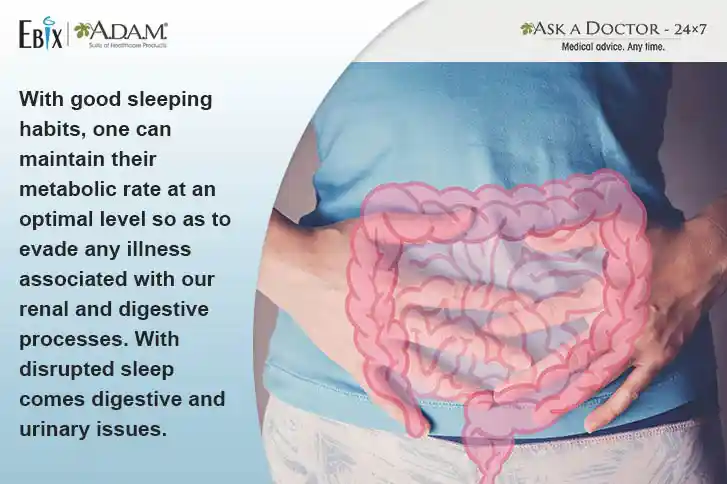
Due to the peak production of hormones involved in metabolism, many such processes take place where detoxification and the removal of waste and hazardous chemicals occur. Either these processes occur via the liver and are thrown out through feces or are filtered in the kidney through urine. Hence, good health needs good sleep.
8. Brain Maturation
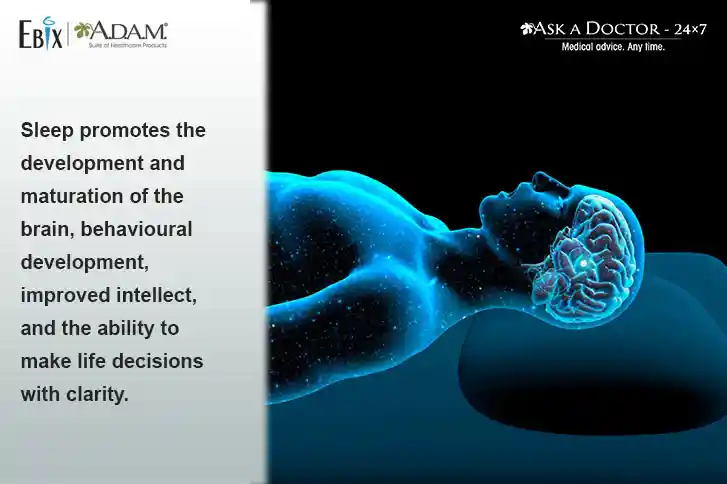
This in a sense is the processing of all the information and experiences, keeping it available for future encounters with such stimuli. It is a way of learning how to grow in the outer world. The information is analyzed and suitable responses are formulated which depends on our hormone profile and other inputs in our life. This makes our character unique and makes us what we are. And. a good night sleep helps in smooth processing of all the functions of our brain.
9. Circadian Rhythm
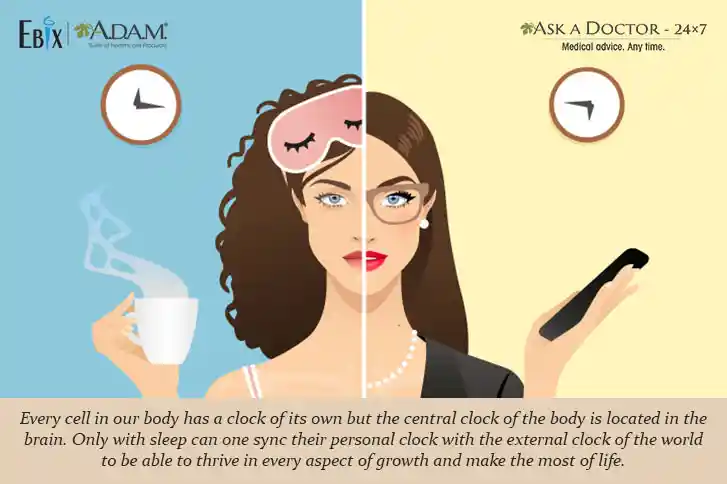
Circadian rhythm is a rhythm that needs no clock but performs as one. Regular sleep timing is essential to stick to the clock which involves the release of specific hormones at specific times as per the requirement of the body. This makes the metabolism follow a pattern and function smoothly without any confusion.
10. Dreams

A dream is a fantasy in which a part of sleep is spent but it isn’t one. Dreams are nothing but a process where the information in the brain is processed. The inputs to this process are via experiences and thoughts. Yet, the validity of them is not certain. Some information passes through a partly conscious part of the mind, projecting it as a dream. Some have meaning, some do not. It is their relevance to reality that frames one’s character.
What Happens If One Doesn't Get Enough Sleep or Take Sedatives

A doctor is most of the time asked, “What happens if we don’t sleep enough?”, “What happens if we take sleeping pills?”, “I am not getting enough sleep” or “I am working in shifts; is it dangerous?” The answer to these questions is precisely what has been explained above. If we do not sleep enough, many of the vital processes discussed above do not occur well, causing health problems.
Working in shifts is one situation where one has to disturb their circadian rhythm. It is not advisable, yet, under unavoidable circumstances, it has to be made sure that the brain is given ample time to adapt to the rhythm we want. Sudden changes in the rhythm due to short shift postings are not safe at all. A minimum of a month or more is needed for one to get adjusted to the new shift and avoid sudden movement into other shifts.
If one gets addicted to sleeping pills or consumes them more, the natural processes that occur during natural sleep do not occur to their optimal level. Sleep is a voluntary process by the brain that decides when to sleep. If forced with sedatives, though the consciousness dips, the processes which occur during natural sleep do not occur and the person is for sure at a loss.
Not getting enough sleep, not only disturbs the vital hormones and the normal body metabolism but also affects one’s mood, brain maturation, dreams, etc. These processes decide a person’s character. Hence, one can go into depression or any other form of psychological problem. So, one must take sleep seriously to ensure consistent health and healthy lifestyle. Sleep well to live a long and healthy life.
In case you need a personalized guidance to improve your sleep pattern and associated health concerns you can consult an online specialist now.
Ask a Specialist
Recent Questions


